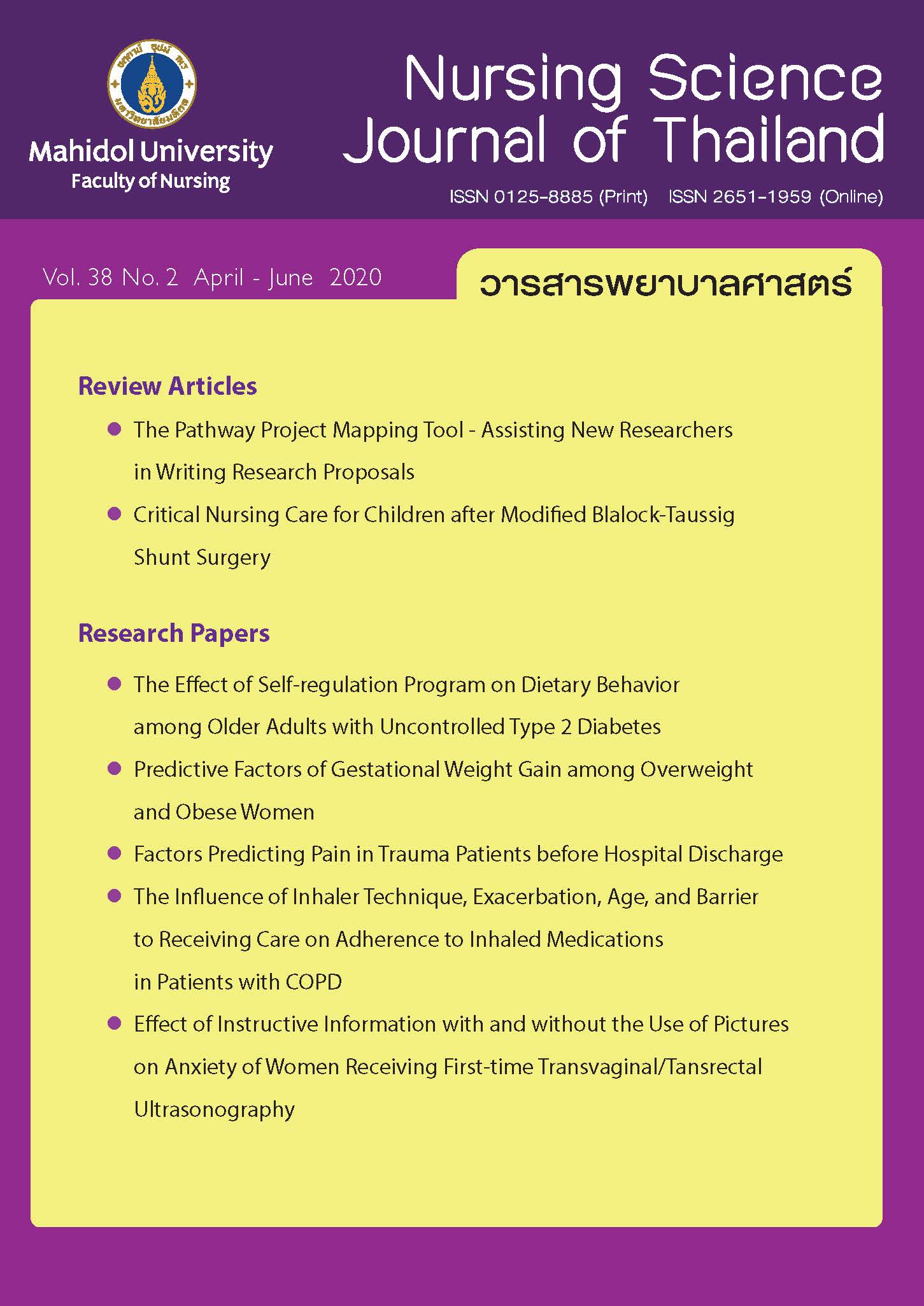ปัจจัยทำนายน้ำหนักที่เพิ่มขึ้นในขณะตั้งครรภ์ของสตรีที่มีภาวะน้ำหนักเกินและอ้วน
Main Article Content
บทคัดย่อ
วัตถุประสงค์: เพื่อศึกษาอำนาจในการทำนายของอายุ จำนวนครั้งของการคลอด สถานภาพสมรส การได้รับคำแนะนำเกี่ยวกับภาวะน้ำหนักเกินและอ้วน และการเข้าถึงอาหารที่ดีต่อสุขภาพต่อน้ำหนักที่เพิ่มขึ้นขณะตั้งครรภ์ของสตรีที่มีภาวะน้ำหนักเกินและอ้วน
รูปแบบการวิจัย: การวิจัยเชิงทำนาย
วิธีดำเนินการวิจัย: กลุ่มตัวอย่างเป็นมารดาหลังคลอดที่มีภาวะน้ำหนักเกินและอ้วนก่อนการตั้งครรภ์ที่มาฝากครรภ์และคลอดที่โรงพยาบาลศิริราช มีคุณสมบัติตามเกณฑ์จำนวนทั้งหมด 150 ราย เก็บรวบรวมข้อมูลโดยใช้แบบสอบถามข้อมูลส่วนบุคคล แบบสอบถามการได้รับคำแนะนำเกี่ยวกับภาวะน้ำหนักเกินและอ้วน และแบบสอบถามการเข้าถึงอาหารที่ดีต่อสุขภาพ วิเคราะห์ข้อมูลโดยใช้สถิติเชิงพรรณนา และสถิติถดถอยโลจิสติค
ผลการวิจัย: อายุ จำนวนครั้งของการคลอด และการได้รับคำแนะนำเกี่ยวกับภาวะน้ำหนักเกินและอ้วน สามารถร่วมกันทำนายน้ำหนักที่เพิ่มขึ้นขณะตั้งครรภ์ของสตรีที่มีภาวะน้ำหนักเกินและอ้วนได้อย่างมีนัยสำคัญทางสถิติ (p < .05) โดยพบว่า สตรีที่มีภาวะน้ำหนักเกินและอ้วนที่อายุต่ำกว่า 25 ปีเสี่ยงต่อการมีน้ำหนักเพิ่มขึ้นขณะตั้งครรภ์เกินเกณฑ์มากกว่าสตรีที่มีภาวะน้ำหนักเกินและอ้วนที่มีอายุระหว่าง 25-34 ปี 2.84 เท่า (OR = 2.84; 95%CI = 1.01, 7.95) สตรีที่มีภาวะน้ำหนักเกินและอ้วนที่ไม่เคยผ่านการคลอดเสี่ยงต่อการมีน้ำหนักเพิ่มขึ้นขณะตั้งครรภ์เกินเกณฑ์มากกว่าสตรีที่เคยผ่านการคลอดมาแล้ว 2.78 เท่า (OR = 2.78; 95%CI = 1.30, 5.93) และสตรีที่มีภาวะน้ำหนักเกินและอ้วนที่ไม่ได้รับคำแนะนำเกี่ยวกับน้ำหนักที่เพิ่มขึ้นขณะตั้งครรภ์หรือข้อมูลไม่ถูกต้องเสี่ยงต่อการมีน้ำหนักเพิ่มขึ้นขณะตั้งครรภ์เกินเกณฑ์มากกว่าสตรีที่ได้รับคำแนะนำและข้อมูลถูกต้อง 3.33 เท่า (OR = 3.33; 95%CI = 1.58, 7.01)
สรุปและข้อเสนอแนะ: อายุ จำนวนครั้งของการคลอด และการได้รับคำแนะนำเกี่ยวกับภาวะน้ำหนักเกินและอ้วน สามารถทำนายน้ำหนักที่เพิ่มขึ้นขณะตั้งครรภ์ของสตรีที่มีภาวะน้ำหนักเกินและอ้วนได้ โดยเฉพาะการได้รับคำแนะนำ ซึ่งบุคลากรทางการแพทย์ควรให้คำแนะนำที่ถูกต้อง รวมทั้งส่งเสริมสตรีตั้งครรภ์ให้มีพฤติกรรมการบริโภคอาหารที่ดีต่อสุขภาพ
Article Details
ลิขสิทธิ์: วารสารพยาบาลศาสตร์เป็นเจ้าของลิขสิทธิ์ในการเผยแพร่ผลงานที่ตีพิมพ์ ห้ามผู้ใดนำบทความที่ได้รับการตีพิมพ์ในวารสารพยาบาลศาสตร์ไปเผยแพร่ในลักษณะต่างๆ ดังต่อไปนี้ การส่งบทความไปตีพิมพ์เผยแพร่ที่อื่น การนำบทความเผยแพร่ออนไลน์ การถ่ายเอกสารบทความเพื่อกิจกรรมที่ไม่ใช่การเรียนการสอน ยกเว้นเสียแต่ได้รับอนุญาตจากวารสารพยาบาลศาสตร์

Disclaimer: เนื้อหาบทความหรือข้อคิดเห็นใดๆ ในวารสารพยาบาลศาสตร์ ถือเป็นความรับผิดชอบของผู้เขียน กองบรรณาธิการไม่จำเป็นต้องเห็นด้วยและไม่มีส่วนรับผิดชอบแต่อย่างใด
เอกสารอ้างอิง
Deputy NP, Sharma AJ, Kim SY. Gestational weight gain - United States, 2012 and 2013. MMWR Morb Mortal Wkly Rep. 2015;64(43):1215-20. doi:10.15585/mmwr.mm6443a3.
Deputy NP, Sharma AJ, Kim SY, Hinkle SN. Prevalence and characteristics associated with gestational weight gain adequacy. Obstet Gynecol. 2015;125(4):773-81. doi:10.1097/AOG.0000000000000739.
Sunsaneevithayakul P, Titapant V, Ruangvutilert P, Sutantawibul A, Phatihattakorn C, Wataganara T, et al. Relation between gestational weight gain and pregnancy outcomes. J Obstet Gynaecol Res. 2014;40(4):995-1001. doi:10.1111/jog.12293.
Thanaratsiriworakul K, Suriya N, Sananpanichkul P. Comparison of gestational weight gain recommendations between study from Thai population and U.S. Institute of Medicine. Thai Journal of Obstetrics and Gynaecology. 2016;24(3):161-8.
Krukowski RA, Bursac Z, McGehee MA, West D. Exploring potential health disparities in excessive gestational weight gain. J Womens Health (Larchmt). 2013;22(6):494-500. doi: 10.1089/jwh.2012.3998.
Dennedy MC, Dunne F. Maternal obesity and pregnancy. In: Ovesen PG, Jensen DM, editors. Maternal obesity and pregnancy. Berlin Heidelberg: Springer-Verlag; 2012. p.99-117.
Kominiarek MA, Saade G, Mele L, Bailit J, Reddy UM, Wapner RJ, et al. Association between gestational weight gain and perinatal outcomes. Obstet Gynecol. 2018;132(4):875-81. doi: 10.1097/AOG.0000000000002854.
Rasmussen KM, Yaktine AL. Weight gain during pregnancy: rexaming the guidelines. Washington, DC: National Academies Press; 2009. 842 p.
Garmendia ML, Mondschein S, Matus O, Murrugarra R, Uauy R. Predictors of gestational weight gain among Chilean pregnant women: the Chilean maternal and infant nutrition cohort study. Health Care Women Int. 2017;38(8):892-904. doi: 10.1080/07399332.2017.1332627.
Heery E, Kelleher CC, Wall PG, McAuliffe FM. Prediction of gestational weight gain - a biopsychosocial model. Public Health Nutr. 2015;18(8):1488-98. doi: 10.1017/S1368980014001815.
Jantradee B, Serisathian Y, Phahuwatanakorn W. Predictive factors of gestational weight gain. Journal of the Royal Thai Army Nurses. 2014;15(2):339-47. (in Thai).
Knight-Agarwal CR, Williams LT, Davis D, Davey R, Shepherd R, Downing A, et al. The perspectives of obese women receiving antenatal care: a qualitative study of women's experiences. Women Birth. 2016;29(2):189-95. doi: 10.1016/j.wombi.2015.10.008.
Deputy NP, Sharma AJ, Kim SY, Olson CK. Achieving appropriate gestational weight gain: the role of healthcare provider advice. J Womens Health (Larchmt). 2018;27(5):552-60. doi: 10.1089/jwh.2017.6514.
Siriarunrat S, Tatirat T, Deoisres W. Prevalence and factors affected to excessive gestational weight gain among pregnant women in the eastern part of Thailand. Journal of Public Health Nursing. 2018;32(3):19-36. (in Thai).
Liu J, Whitaker KM, Yu SM, Chao SM, Lu MC. Association of provider advice and pregnancy weight gain in a predominantly hispanic population. Womens Health Issues. 2016;26(3):321-8. doi: 10.1016/j.whi.2016.01.004.
The American College of Obstetricians and Gynecologists [ACOG]. Committee opinion: weight gain during pregnancy [Internet]. Washington, DC; National Academies Press; 2009 [cited 2019 Feb 20]. Available from: https://www.acog.org/Clinical-Guidance-and-Publications/Committee-Opinions/Committee-on-Obstetric-Practice/Weight-Gain-During-Pregnancy.
Peduzzi P, Concato J, Kemper E, Holford TR, Feinstein AR. A simulation study of the number of events per variable in logistic regression analysis. J Clin Epidemiol. 1996;49(12):1373-9. doi: 10.1016/s0895-4356(96)00236-3.
Weisman CS, Hillemeier MM, Downs DS, Chuang CH, Dyer AM. Preconception predictors of weight gain during pregnancy: prospective findings from the central Pennsylvania women's health study. Womens Health Issues. 2010;20(2):126-32. doi: 10.1016/j.whi.2009.12.002.
Emery RL, Benno MT, Salk RH, Kolko RP, Levine MD. Healthcare provider advice on gestational weight gain: uncovering a need for more effective weight counselling. J Obstet Gynecol. 2018;38(7):916-21. doi: 10.1080/01443615.2018.1433647.
Green SH, Glanz K. Development of the perceived nutrition environment measures survey. Am J Prev Med. 2015;49(1):50-61. doi: 10.1016/j.amepre.2015.02.004.
Laraia BA, Siega-Riz AM, Kaufman JS, Jones SJ. Proximity of supermarkets is positively associated with diet quality index for pregnancy. Prev Med. 2004;39(5):869-75. doi: 10.1016/j.ypmed.2004.03.018.
Kriengsinyos W, Phanvijhitsiri K. Dietary advice for pregnant and lactating women. In: Food and nutrition knowledge for all ages. Nonthaburi: Food and Drug Administration; 2016. p.99-117. (in Thai).
Nithitantiwat P, Udomsapaya W. Food consumption behavior among Thai adolescents, impacts, and solutions. Journal of Phrapokklao Nursing College. 2017;28(1):122-8. (in Thai).
Thadakant S, Pruksacheva T, Jaovisigha A. Health perceptions of obese pregnant women with gestational diabetes and/or hypertension toward themselves and their fetuses. Ramathibodi Nursing Journal. 2010;16(2):185-99. (in Thai).
Laraia BA, Siega-Riz AM, Gundersen C. Household food insecurity is associated with self-reported pregravid weight status, gestational weight gain, and pregnancy complications. J Am Diet Assoc. 2010;110(5):692-701. doi: 10.1016/j.jada.2010.02.014.


